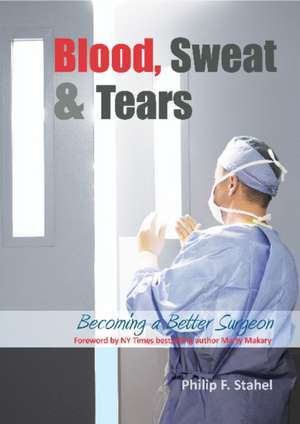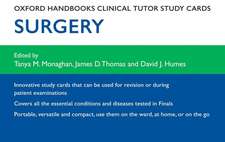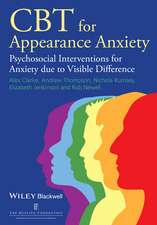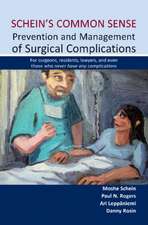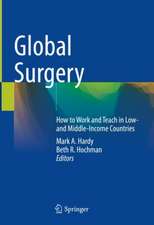Blood, Sweat & Tears: Becoming a Better Surgeon
Autor Philip F Stahel MD, FACSen Limba Engleză Hardback – 31 ian 2016
Preț: 148.88 lei
Preț vechi: 166.68 lei
-11% Nou
Puncte Express: 223
Preț estimativ în valută:
28.49€ • 29.74$ • 23.58£
28.49€ • 29.74$ • 23.58£
Carte disponibilă
Livrare economică 14-28 martie
Preluare comenzi: 021 569.72.76
Specificații
ISBN-13: 9781910079270
ISBN-10: 1910079278
Pagini: 296
Dimensiuni: 210 x 150 x 25 mm
Greutate: 0.68 kg
Editura: TFM Publishing Ltd
Colecția TFM Publishing Ltd (UK)
ISBN-10: 1910079278
Pagini: 296
Dimensiuni: 210 x 150 x 25 mm
Greutate: 0.68 kg
Editura: TFM Publishing Ltd
Colecția TFM Publishing Ltd (UK)
Recenzii
"I applaud Dr Stahel for presenting a rich compilation of his honest and remarkable first-hand experiences and the collective work of doctors and health care leaders to reduce the endemic variation in medical quality that contributes to the #3 cause of death in the U.S. today -- medical care itself. -- Marty Makary MD, Author of The New York Times bestseller, "Unaccountable" "Blood, Sweat & Tears is a great book, one of a kind, and destined to be a medical classic. What makes the book exceptional is the narrative about a difficult human endeavor, often done imperfectly, by humans who have been told they should be perfect. This quintessential paradox is why this book is a practical story about life and will likely be of interest and enjoyment to many outside the realm of medicine." -- Wade Smith MD, Co-founding Editor, "Patient Safety in Surgery" Blood, Sweat & Tears is a unique book - clearly one of a kind, and surprisingly not just of interest to those who work in healthcare. The book has a captivating narrative flow and the medical aspects are very easy to understand for non-clinical/laypersons as well. I will be sending my "baby boomer" parents a copy as it becoming increasingly important for the community to understand the complexity and challenges of our current healthcare system. My take-home point from this book is that we can and we should be involved in our healthcare choices and ask important and pertinent questions. If you're like me, and you're interested in patient safety and eventually receiving high quality medical care if you ever become a patient, if you have a sense of humor, and you would like a different perspective on healthcare, this is the book for you! Nicole Morgan, MHA
Blood, Sweat & Tears: How to Become a Better Surgeon is a remarkable book that emphasizes empathy and communication, provocatively authored by a surgeon. However, as the reader will soon discover, Philip Stahel is not your ordinary surgeon. I strongly recommend every health care provider read this book. I further recommend this book be mandatory reading annually for every medical student, intern, resident and fellow-in-training, most especially chapters 3 and 4, which epitomize William Osler's advice, "Listen to the patient - he is telling you the diagnosis". In these 20 chapters, the many other insightful quotes alone are worth the purchase price. - Jerome M.Buckley, MD Retired CEO/Chairman, COPIC Companies, Associate Clinical Professor, University of Colorado School of Medicine
The emphasis on empathy is a crucial but neglected part of quality improvement. Why do our patients so frequently not adhere to our instructions? Putting yourself in the patient's position creates an essential surgeon-patient bond that underlies an optimal outcome. Dr. Stahel did not write the golden rule of "love thy neighbor as thyself", but it is clear that he sees this as an essential part of the surgeon-patient partnership. Both surgeon and patient will feel this effect, and it will pay dividends for both parties in the near and distant future. It is an important but disturbing reflection that many medical students lose their empathetic qualities during their clerkship years. There are many reasons that underlie this loss including our role models, the frantic pace of clinical activities, and the lack of clear direction as to the medical student role. Importantly, Dr. Stahel gives us a path to finding our empathy by rediscovering our humanism. Relating to the janitor, the nurse, and other members of the care team as people is an important first step in understanding the common ground that we share with our patients. Letting each member of the surgical team call the professor by his first name clearly tells the staff that all are important and essential. Giving his phone number to his patients shows the trust that Dr. Stahel shares with those who trust him. - Ted Clarke, MD, Orthopaedic Surgeon and CEO and Chairman of COPIC, Denver, Colorado
As a veteran Registered Nurse I feel that this book is a must read for anyone in health care! Dr. Philip Stahel has a very down to Earth writing style and compassionate approach to patient care. Reading this book has reinvigorated my love of nursing and passion for patient care. - Kerry Olson, RN
Blood, Sweat & Tears: How to Become a Better Surgeon is a remarkable book that emphasizes empathy and communication, provocatively authored by a surgeon. However, as the reader will soon discover, Philip Stahel is not your ordinary surgeon. I strongly recommend every health care provider read this book. I further recommend this book be mandatory reading annually for every medical student, intern, resident and fellow-in-training, most especially chapters 3 and 4, which epitomize William Osler's advice, "Listen to the patient - he is telling you the diagnosis". In these 20 chapters, the many other insightful quotes alone are worth the purchase price. - Jerome M.Buckley, MD Retired CEO/Chairman, COPIC Companies, Associate Clinical Professor, University of Colorado School of Medicine
The emphasis on empathy is a crucial but neglected part of quality improvement. Why do our patients so frequently not adhere to our instructions? Putting yourself in the patient's position creates an essential surgeon-patient bond that underlies an optimal outcome. Dr. Stahel did not write the golden rule of "love thy neighbor as thyself", but it is clear that he sees this as an essential part of the surgeon-patient partnership. Both surgeon and patient will feel this effect, and it will pay dividends for both parties in the near and distant future. It is an important but disturbing reflection that many medical students lose their empathetic qualities during their clerkship years. There are many reasons that underlie this loss including our role models, the frantic pace of clinical activities, and the lack of clear direction as to the medical student role. Importantly, Dr. Stahel gives us a path to finding our empathy by rediscovering our humanism. Relating to the janitor, the nurse, and other members of the care team as people is an important first step in understanding the common ground that we share with our patients. Letting each member of the surgical team call the professor by his first name clearly tells the staff that all are important and essential. Giving his phone number to his patients shows the trust that Dr. Stahel shares with those who trust him. - Ted Clarke, MD, Orthopaedic Surgeon and CEO and Chairman of COPIC, Denver, Colorado
As a veteran Registered Nurse I feel that this book is a must read for anyone in health care! Dr. Philip Stahel has a very down to Earth writing style and compassionate approach to patient care. Reading this book has reinvigorated my love of nursing and passion for patient care. - Kerry Olson, RN
